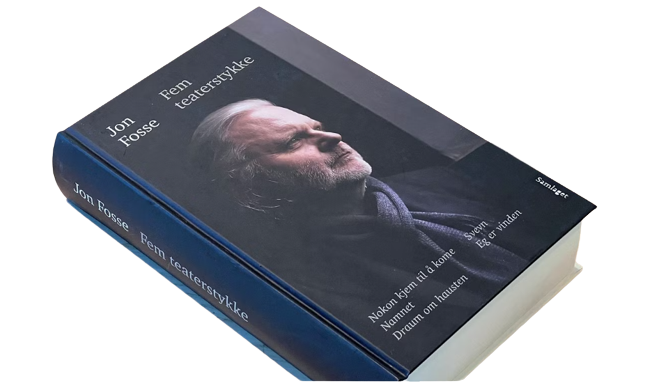Nobel Prize in Literature of 2023 has been awarded to Norwegian Author Jon Fosse for the innovative play of his and prose which give voice to the unsayable”. “Jon Fosse depicts commonplace events that are immediately relatable to our own life. His dramatic action and extreme language reduction portray the most potent human emotions—anxiety and helplessness—in the most straightforward manner.
The reason that Nobel Prize winner Jon Fosse is recognized as a major innovator in modern theater is because of his capacity to portray man’s loss of orientation and how, paradoxically, this can allow access to a higher experience bordering on divinity.
Nobel Prize in Literature 2023

The 2023 Nobel Prize in Literature has just been given to Jon Fosse for his “innovative plays and prose which give voice to the unsayable”.
The deserving laureate, who is 64 years old and well-known in Norwegian literary and cultural circles, is the fourth Norwegian to receive the most prestigious literary award in the world. In addition, he follows French author Annie Ernaux, who won the Nobel Prize for Literature last year, as the second consecutive winner to have his work published by Fitzcarraldo Editions (in an English translation).
The work of the author who was once called the 21st century Beckett and won the 2023 Nobel Prize for Literature examines the nature of existence, loss, and spirituality.
| Aspect | Nobel Prize in Literature |
| Prize Money | 10 million Swedish krona (approximately $915,000) |
| Eligibility | Awarded to an author, writer, or poet for their outstanding contributions to literature. |
| Selection Procedure | The Nobel Prize in Literature is awarded by the Swedish Academy, which reviews nominations and selects the laureate based on the overall quality and impact of their literary work. |
| Conferring Authority | Awarded by the Swedish Academy, based on their selection process. |
Jon Fosse Biography
Fosse, who was born in 1959, initially wrote books before transitioning to plays in his 30s. He went on to become one of Norway’s most performed playwrights and is currently one of the most played playwrights in all of Europe. More than 40 languages have versions of his works.
The less popular of the two official Norwegian dialects, Nynorsk, is the language that Fosse uses while writing. According to Reuters, he claimed that he owed the Nobel Prize ultimately to the language since he saw it as an acknowledgment of the language and the movement promoting it.
Jon Fosse Literary Works

Jon Fosse’s journey in the realm of letters commenced with the lyrical grace of poetry, an offering that swiftly found its rightful acclaim. Yet, it was the stage, the realm of playwriting, that unfurled the full brilliance of his talent to the world. In his plays, where words are chosen with a painter’s precision, he delves into the very core of human existence, resonating deeply with souls across borders. The magic of his prose transcends barriers, dancing on stages across continents, in languages as varied as the human tapestry.
In the tapestry of his creations, notable gems like “Nightsongs,” “The Name,” and “A Summer’s Day” gleam, each a testament to his mastery over the theatrical canvas, and his gift to articulate the ineffable realms of the human heart.
Before the coveted Nobel Prize in Literature embraced him in 2023, Jon Fosse’s journey was already adorned with a constellation of accolades. From the Brage Prize to the Dobloug Prize, his name was etched in the annals of Norwegian literary brilliance. These honors celebrated his exceptional ability to push the boundaries of literary expression, a beacon for fellow seekers of truth through words.
Jon Fosse Best Books
Jon Fosse has been the author of number of book some of his best books with its short description have been provided below in the table:
| Jon Fosse Best Books | Short Description |
| “Nightsongs” | A play known for its minimalist dialogue and deep exploration of existential themes. |
| “The Name” | Another of Fosse’s plays, which delves into the human experience through unique storytelling. |
| “A Summer’s Day” | This play showcases Fosse’s mastery of the theatrical medium and his ability to capture the essence of life’s fleeting moments. |
| “Melancholy” | A notable prose work known for its introspective and meditative style, exploring the inner lives of characters. |
| “The Other Name: Septology I-II” | This work is a profound exploration of existential questions and the complexities of human existence. |
| “Boathouse” | Fosse’s writing in this novel continues his tradition of poetic and reflective storytelling, offering readers a deep dive into the human psyche. |
| “Raudt” (Debut Novel, 1983) | Fosse’s defiant and emotionally raw debut novel that explored the subject of suicide and set the tone for his later writing. |
| “svart” (Publication Year: 1983) | A significant work in Fosse’s early career, known for its emotional depth and exploration of dark themes. |
Jon Fosse not very popular in the English-speaking world
In the heart of Europe, Jon Fosse’s brilliance has long been hailed. Yet, across the seas in the United Kingdom, his name remains a quieter echo, a gem waiting to be discovered. Similarly, in the vast expanse of the United States, his luminary presence is yet to fully illuminate the theatrical landscape. This relative obscurity has cast a shadow on his recognition in the broader English-speaking realms, including the vibrant tapestry of India.
Some say it’s the themes he weaves, intricate and profound, that find it harder to strike a chord in the UK and the US. Perhaps, it’s the peculiarities of his narratives that make them feel like distant constellations, just beyond the reach of immediate connection. Yet, beneath this surface lies a reservoir of emotion, waiting for those willing to dive deep into the currents of Fosse’s world.
Nobel Prize in Literature
The Nobel Prize in Literature stands as a radiant beacon in the realm of human achievement, an emblem of extraordinary contributions to the tapestry of words and stories that shape our world. Conceived from the legacy of Alfred Nobel, a visionary inventor who left an indelible mark on history, these prizes were forged to honor those who illuminate humanity’s path forward, be it in the realms of physics, chemistry, or the profound landscape of literature.
Yet, the Nobel Prize in Literature holds a singular distinction. Unlike its counterparts, it doesn’t confine itself to rigid categories or scientific disciplines. Instead, it seeks out the scribes, the poets, the playwrights whose words unfurl extraordinary realms. It is a nod from the esteemed Swedish Academy to those whose literary alchemy has birthed novels, poems, essays, and plays, each a testament to the power of the written word.
In the grand arc of time, the Nobel Prize in Literature has graced the deserving, crossing borders and cultures, uniting the diverse voices that echo through the ages. From the resolute prose of Ernest Hemingway to the magical realism of Gabriel García Márquez, from the lyrical revelations of Toni Morrison to the poetic musings of Bob Dylan, these literary luminaries have not only captivated minds but also reshaped the landscape of literature and culture itself. Thus, the Nobel Prize in Literature stands as a cherished emblem, a touchstone of influence, forever etched in the annals of human expression.
Frequently Asked Questions
1. What is Jon Fosse famous for?
Fosse has long been famous and beloved outside of England and America—in the rest of the world he is first and foremost a playwright.
2. Who won the 2023 Nobel Prize in Literature?
Norwegian author and dramatist Jon Fosse won the 2023 Nobel Prize in Literature on Thursday “for his innovative plays and prose which give voice to the unsayable,
3. What language does Jon Fosse write in?
Fosse writes in Nynorsk, a minority language, rather than Bokmål, the more widely used Norwegian language for literature.
4. What was Fosse choreography style?
Fosse’s full-bodied signature jazz choreography created a style and a language that speaks for itself.
5. Why was Fosse style so unique?
Fosse’s first fully choreographed show was 1954’s “The Pajama Game.”made Fosse an overnight success and showcased his trademark choreographic style.







